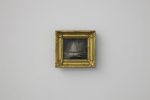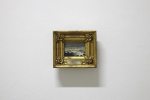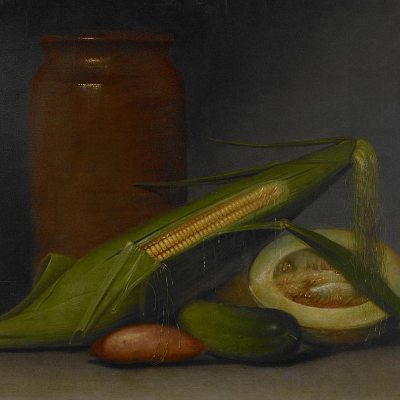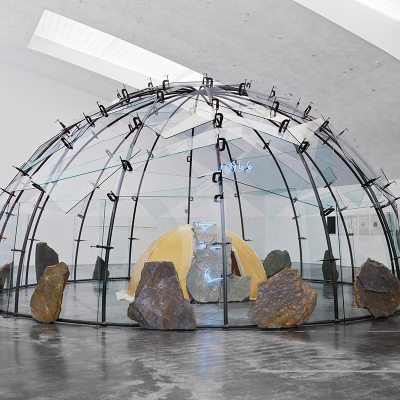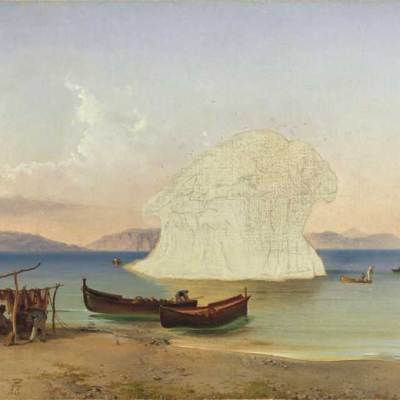A K Dolven’s work is supremely elegant. Exploring her body’s sensual relationship to the Norwegian landscape that she calls home (when she’s not living in London, that is), the paintings, video and sound works currently on show at Ikon gallery in Birmingham are beautifully simple. Some of them seem barely there, yet there is a wry humour to be found in each one.
‘A K Dolven, please return’ (installation view, Ikon Gallery, Birmingham, 4 February–19 April 2015) ikon-gallery.org. Photo by Stuart Whipps

‘A K Dolven: please return’ begins with a large painting titled just another puberty (2014). Dolven has applied the paint with her fingertips and the palms of her hands, smearing black, buttery marks on to a smooth, unyielding aluminium surface. To the left of this work is a specially constructed corridor that juts into a room not usually given over to exhibitions. The corridor’s narrow interior is painted glossy white and its walls frame her film I discovered the end I wanted to live really long (2013), which was shot on 16 mm film during the arctic winter at Vestvågøy, Lofoten in Norway. In this work, the artist’s upper legs can be seen from her perspective, opening and closing gently, rhythmically. Behind her legs is a mountain, framed in such a way as to make it seem, to me at least, that Dolven is giving birth to the landscape. Warm skin on snow-covered ground; it suggests the sensual connection of the body to the landscape.
A K Dolven on location for ‘When I discovered the end I wanted to live really long’ (2013) © Vegar Moen, courtesy the artist and Ikon. ikon-gallery.org. ikon-gallery.org. Photo by Stuart Whipps

Ikon’s events room and storage area, which the corridor leads to, is usually inaccessible, but for the duration of this show contains a further work, liberty (2008). It comprises a wall text written by hand in looping pencil strokes, and a video installation of icebergs in Antarctica that resemble the Statue of Liberty and which can be viewed intimately through two peep holes cut into a door. Faint pencil text features throughout the exhibition as Dolven titles each of her works on the wall beside to them. It’s a personal touch that highlights her bodily and performative approach to making and naming art, and is testament to the precision and care that she has taken with this display.
The exhibition is punctuated by three works by 19th-century painter Peder Balke (1804–87), who is currently the subject of a major retrospective at the National Gallery (until 12 April). Similarly concerned with the sublime nature of Norwegian landscape, and often made en plein air, Balke’s tiny paintings are hugely expressive. Thick, creamy oil paint rolls across paper and canvases the size of postcards, depicting seas crashing and roaring, and seagulls circling above. This is the first time Dolven’s work has been shown alongside Balke’s. She has a deep affection for his work and shares his sense of the figure in the landscape, and the shifts in scale that seem to separate the two.
Elsewhere in the show, Dolven’s Horizontal Painting (2015), which is propped up off the floor by old monitors, uses the same buttery black paint on aluminium as the opening work – only this time the paint is applied by foot. Her prints trace a journey across the two large pieces of metal, soft skin and muscle connecting with coldness and hardness. In several smaller wall-mounted works nearby, whispers of paint drift across white or black grounds on a comparative scale to Balke’s tiny paintings.
One of the most interesting things that Dolven’s exhibition provokes is a new view of the gallery’s physical spaces. The walls are no longer neutral or invisible structures. Instead, their stark, bright whiteness can be read as echoing blocks of snow or ice and the concrete gallery floor resembles a smooth rock-like surface. Dolven’s paintings, in particular, seem to exist within this space as objects or bodies on the distant horizon. The title work, please return (2014), is a sound piece. A female voice exclaiming ‘Come!…Come!…Coooome!…’ at intervals can be heard from the main exhibition space all the way down to the gallery’s ground floor. Its exclamation, at once a command, an invitation and a cry of pleasure, entices curious visitors into its almost empty room.
Each object plays its role and each visiting body animates Dolven’s landscape with every step, every stop, every look and every listen.
‘A K Dolven: please return’ is at Ikon gallery, Birmingham, until 19 April.
Related Articles
Scandinavian Art in the UK (Kitty Corbet Milward)
Peder Balke’s Arctic landscapes in the National Gallery (Maggie Gray)

